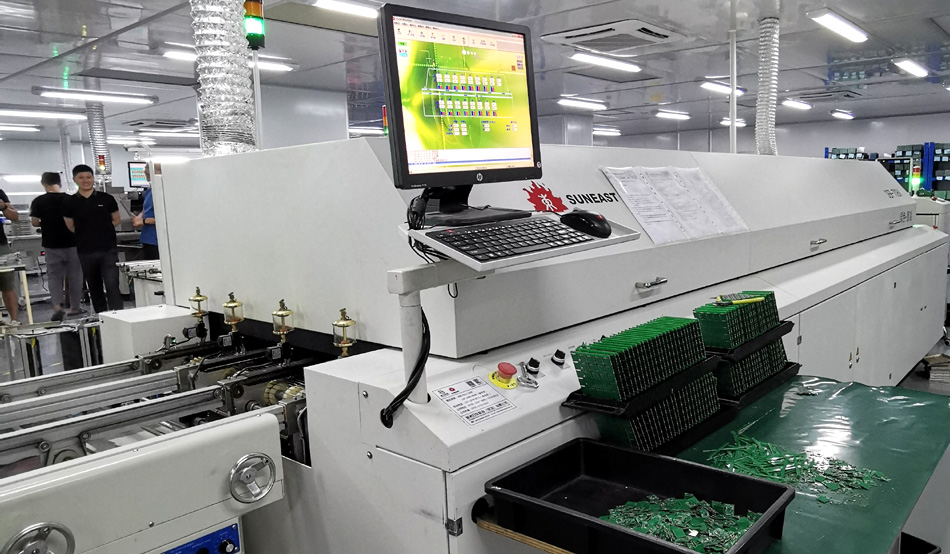- English
- Español
- Português
- русский
- Français
- 日本語
- Deutsch
- tiếng Việt
- Italiano
- Nederlands
- ภาษาไทย
- Polski
- 한국어
- Svenska
- magyar
- Malay
- বাংলা ভাষার
- Dansk
- Suomi
- हिन्दी
- Pilipino
- Türkçe
- Gaeilge
- العربية
- Indonesia
- Norsk
- تمل
- český
- ελληνικά
- український
- Javanese
- فارسی
- தமிழ்
- తెలుగు
- नेपाली
- Burmese
- български
- ລາວ
- Latine
- Қазақша
- Euskal
- Azərbaycan
- Slovenský jazyk
- Македонски
- Lietuvos
- Eesti Keel
- Română
- Slovenski
- मराठी
- Srpski језик
How will future breakthroughs in PCBA production technology impact factory capacity?
With the growing demand for electronic products, the PCBA processing industry faces higher production capacity and quality requirements. Future breakthroughs in PCBA production technology will directly impact factory capacity in multiple areas, thereby improving production efficiency and meeting diverse market demands. This article will explore how these technological advancements impact PCBA factory capacity through the introduction of new technologies, increased automation, and intelligent manufacturing.

1. Application of New Materials and Processes
High-Density Interconnect (HDI) Technology
High-density interconnect (HDI) technology is one of the key breakthroughs in future PCBA production. With the trend toward miniaturization of electronic devices, HDI technology enables more connections and functions within limited PCB space. By adopting HDI, PCBA factories can increase circuit board integration without increasing board area, thereby improving production capacity while maintaining high performance.
Advanced Packaging Technology
With the continuous advancement of integrated circuits, advanced packaging technologies such as chip-scale packaging (CSP) and 3D packaging are becoming increasingly popular in PCBA processing. By optimizing packaging processes, factories can increase component integration density, reduce assembly space, and enable production lines to handle more complex designs, further increasing production capacity.
2. Improvements in Automated Production Lines
Smart Manufacturing and Automated Equipment
In the future, PCBA factory production capacity will rely heavily on improved automation. Modern SMT (surface mount technology) and AOI (automated optical inspection) equipment can significantly improve production line speed and accuracy, reduce manual intervention, and thus increase overall production capacity. Smart manufacturing systems can monitor production data in real time, optimize production processes, reduce downtime, and further improve factory efficiency.
Application of Robotics
The introduction of robotics technology has made PCBA factory production lines more flexible and efficient. Robots can quickly and accurately perform complex placement and soldering tasks, reducing human error and adapting to fluctuating order requirements. With robotics, factories can process multiple orders simultaneously, significantly increasing production output per unit time.
3. Data-Driven Production Management
Big Data and Predictive Maintenance
Future PCBA processing will increasingly rely on big data technology for production management. By collecting and analyzing production data, factories can more accurately predict equipment failures and material requirements, reducing downtime. Predictive maintenance technology enables timely maintenance of equipment before failures occur, preventing disruptions to production schedules and improving overall factory productivity.
Real-Time Monitoring and Feedback System
The introduction of a real-time monitoring system enables PCBA factories to track and provide feedback on every step of the production process. This system allows factory managers to quickly respond to unusual situations, optimize production processes, and ensure efficient operation of each process, thereby maximizing production line capacity utilization.
4. Implementation of Flexible Manufacturing
Advantages of Flexible Production Lines
Flexible production lines will become a major trend in the PCBA industry. Traditional production lines are typically limited to single, high-volume production, while flexible production lines can quickly adjust production equipment and processes based on order requirements, enabling high-mix, low-volume production. This flexibility not only improves capacity utilization but also significantly shortens delivery cycles.
Meeting Customized Production Needs
With increasing customer demand for personalized products, PCBA factories must be able to respond quickly to market demands. Flexible manufacturing systems enable factories to quickly adjust production lines to meet the customized needs of different customers without impacting overall production capacity. This capability will open up broader market opportunities for PCBA factories and enhance their competitiveness.
5. Application of Artificial Intelligence
Intelligent Inspection and Quality Control
The introduction of artificial intelligence technology will significantly enhance the quality control capabilities of PCBA factories. AI-driven inspection systems enable factories to automatically identify defects during the production process and make immediate adjustments. This intelligent quality control system not only reduces manual inspection time but also improves production consistency, thereby increasing production capacity.
Intelligent Optimization of Production Processes
AI can also intelligently analyze and optimize production processes, helping PCBA factories identify production bottlenecks and provide optimization recommendations. Through continuous process optimization, factories can maximize production capacity and maintain high levels of production efficiency and product quality.
Conclusion
Future breakthroughs in PCBA production technology will impact factory production capacity through new materials and processes, automated production, data-driven management, flexible manufacturing, and artificial intelligence. These technological advances will not only improve production efficiency but also help factories better adapt to market changes and meet diverse customer needs. In the highly competitive PCBA processing industry, factories that can quickly adopt these technologies will significantly increase production capacity and capture more market opportunities.
Send Inquiry
-
Delivery Service






-
Payment Options









